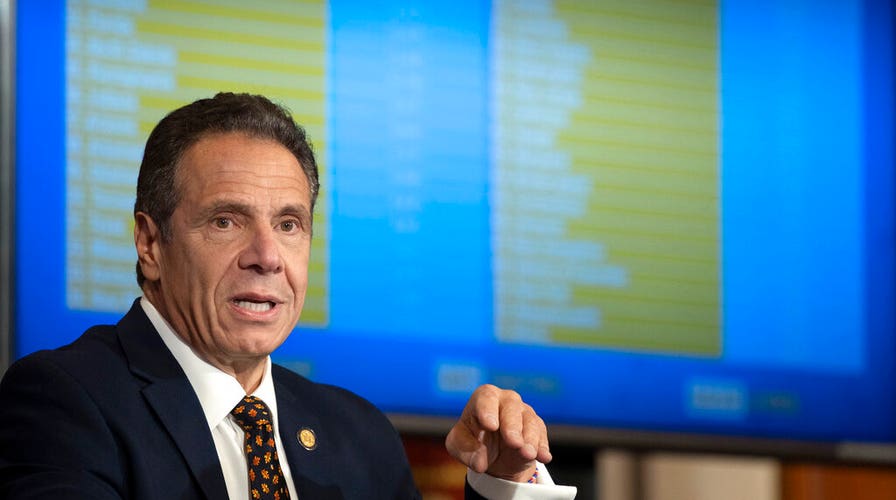New York sheriff rejects Gov. Cuomo's Thanksgiving rules
Fulton County Sheriff Richard Giardino explains why he will not enforce the governors 10-person holiday limit on 'Bill Hemmer Reports'
New York Democrat Gov. Andrew Cuomo's administration argued in a Supreme Court brief filed Wednesday that rather than treating religious venues more harshly than secular venues, as the Catholic Diocese of Brooklyn argues in an emergency application for an injunction with the Supreme Court, that New York's coronavirus restrictions are actually more lenient to houses of worship than they are to places of business.
The court battle between the state and the church comes amid a significant spike in coronavirus cases nationwide that has caused officials to re-institute school closures, bans on indoor dining and even in some cases essentially bar people from inviting others to their houses.
Cuomo's Oct. 6 order is not as strict as some across the country, but it identifies certain areas in the state where it will, based on positivity rates, limit certain activities and capacity in certain places.
The Catholic Diocese of Brooklyn argued that the limits in the order are unfair and discriminate against houses of worship.
NEWSOM LATEST DEMOCRATIC POLITICIAN TO FLOUT OWN CORONAVIRUS GUIDELINES
"In red zones, 'houses of worship' are subject to a capacity limit of '25% of maximum occupancy or 10 people, whichever is fewer,'" the Diocese' emergency request to the court last week read. "By contrast, all 'essential' businesses—a broad category that includes everything from grocery stores to pet shops to accounting and payroll offices—may remain open in red zones without capacity limitations."
The brief, largely quoting from Cuomo's own order, also lays out a situation that is similar in "orange zones."
It adds: "The plain text of the order expressly singles out 'houses of worship,' subjecting them to uniquely burdensome restrictions that do not apply to many secular businesses, and the Governor has acknowledged that these new rules 'are most impactful on houses of worship.'"
But a brief from Cuomo's administration, which was filed with the Supreme Court on Wednesday, argues the contrary: That New York's rules for houses of worship are actually more permissive for religious venues than for secular venues that host similar activities.
The brief lays out a list of activities that are banned in red and orange zones, like movie theatres, spectator sports, concerts and more. This, the New York brief says, is because the nature of the activities put people at higher risk than things like going to the grocery store.
AOC BLASTS TRUMP ADVISER FOR SUGGESTING MORE CORONAVIRUS RELIEF IS NOT NEEDED: 'PEOPLE NEED HELP'
"Instead, in implementing the Cluster Action Initiative, the State opted to treat religion more favorably. Specifically, rather than prohibit houses of worship located in red and orange zones from hosting gatherings altogether, [the order] allows such gatherings to occur, subject to limits on their size," Cuomo's brief says. "The order thus accords preferential treatment to religious gatherings in houses of worship, as compared with secular activities that present 'a similar or greater degree' of risk of COVID-19 spread."
"The Diocese has not demonstrated that any of the secular businesses or activities it identifies(a) presents the same COVID-19 super-spreader potential as indoor religious gatherings yet (b) is regulated by Executive Order 202.68 in a more-permissive manner," the Cuomo brief continues. "The Diocese has thus failed to establish that the order gives preferential treatment to 'a single secular analog.'"
New York and its religious communities have been at odds during the pandemic, especially the Orthodox Jewish community in New York City. It has protested against mask orders and bans on gatherings and felt that it has been singled out by the government.
CLICK HERE TO GET THE FOX NEWS APP
Cuomo's administration, in fact, singles out the Jewish community in the Wednesday brief.
"Many of the State’s early cases were attributable to religious gatherings that served as super-spreader events," it said. "In late February 2020, a 50-year-old-man started showing signs of illness but attended a bat mitzvah and funeral at his synagogue in a New York City suburb; his interactions with others at those events gave rise to the State’s first coronavirus 'cluster': a high concentration of COVID-19 cases occurring within the same geographic area."
There is a similar emergency petition before the Supreme Court from multiple Jewish organizations. Justice Stephen Breyer asked Cuomo's administration to respond to that petition by Friday.






